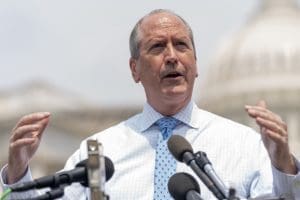GOP bills target nonexistent voting rights violations against unvaccinated
No one in any state is actually being denied their right to vote based on their vaccination status.

House Republicans filed a bill on Wednesday that would protect the rights of unvaccinated people to vote in person. But even the bill’s sponsor admits the problem it addresses is imaginary.
Republican North Carolina Rep. Dan Bishop’s Securing Enfranchisement and the Rights of Voters regardless of Inoculation Status Act would prohibit any state or locality from requiring proof of vaccination in order to vote, in person or otherwise, in any federal election.
As of Wednesday, 22 of his GOP colleagues had signed on as co-sponsors. Every single one of them and Bishop voted in August 2021 against the John R. Lewis Voting Rights Advancement Act, a bill that would have addressed actual voter suppression by reinstating preclearance rules for states and localities with a recent history of discriminatory voting laws.
Sen. Ted Cruz (R-TX), who has repeatedly participated in GOP filibusters to block the voting rights bill in the Senate, introduced the Senate version of Bishop’s bill on Jan. 12. In a statement published on his official Senate website, Cruz said, “These petty tyrants should not be able to strip Americans of their voting rights by demanding vaccine passports at the voting booth. The American people have tolerated enough from lockdown politicians who have grossly marginalized constitutional liberties in the name of COVID-19. This is wrong.”
In addition to banning vaccine requirements, the bills would also bar any face mask requirements unless the polling place offered free masks to anyone without them and exempted people with disabilities.
But no one is actually being denied their right to vote based on their vaccination status.
A handful of localities have adopted temporary vaccine requirements for indoor restaurants, bars, gyms, and entertainment venues. Many of these allow unvaccinated patrons to enter the venues with proof of a negative COVID-19 test.
But these orders have not included polling places. Indeed, the rules adopted by Washington, D.C., and those being considered by Montgomery County, Maryland, expressly contain exceptions for voting.
Bishop even admitted in a statement released by his office that concern over such an issue was purely speculative.
“Democrats have used unconstitutional COVID mandates to disrupt Americans’ lives for two years. They’ve used vaccine requirements, in particular, to get people fired from their jobs or excluded from public life. It’s not hard to imagine that these lockdown authoritarians will try to keep Americans from the voting booth based on vaccine status next,” Bishop said. “We cannot allow this to happen — that’s why I’m proud to join Sen. Cruz in this fight. Now is the time to stand up for liberty.”
While Bishop’s bill purports to protect “the right to vote, including to vote in person,” he has done little to protect that right against real attempts to suppress it.
“Requiring an ID to vote is common sense,” he tweeted on March 1, 2021. “HR 1, the ‘For the Politicians Act,’ strips away state voter ID laws across the country. That’s why I introduced an amendment to protect voter ID laws. Dems shot it down. Shows how much common sense Dems have these days.”
According to the Brennan Center for Justice at New York University, strict photo ID laws “block millions of eligible American citizens from voting,” as up to 11% of eligible American voters “do not have the kind of ID that is required by states with strict ID requirements, and that percentage is even higher among seniors, minorities, people with disabilities, low-income voters, and students.”
Bishop’s campaign issues page boasts of his role in enacting such a law in his state when he served in the North Carolina Senate: “Dan believes requiring a photo ID to vote is common sense. He led the fight to put the successful Voter ID Constitutional Amendment on the ballot in 2018.”
Published with permission of The American Independent Foundation.
Recommended

Biden campaign launches new ad focused on Affordable Care Act
Former President Trump has said he wants to do away with the popular health care law.
By Kim Lyons, Pennsylvania Capital-Star - May 08, 2024
Ohio doctors fear effects of emergency abortion care case set to go before U.S. Supreme Court
A federal law that allows emergency departments to treat patients without regard to their ability to pay will be under U.S. Supreme Court scrutiny this week, and Ohio doctors are concerned about the case’s local impact on emergency abortion care.
By Susan Tebben, Ohio Capital Journal - April 23, 2024
House GOP votes to end flu, whooping cough vaccine rules for foster and adoptive families
A bill to eliminate flu and whooping cough vaccine requirements for adoptive and foster families caring for babies and medically fragile kids is heading to the governor’s desk.
By Anita Wadhwani, Tennessee Lookout - March 26, 2024









































































